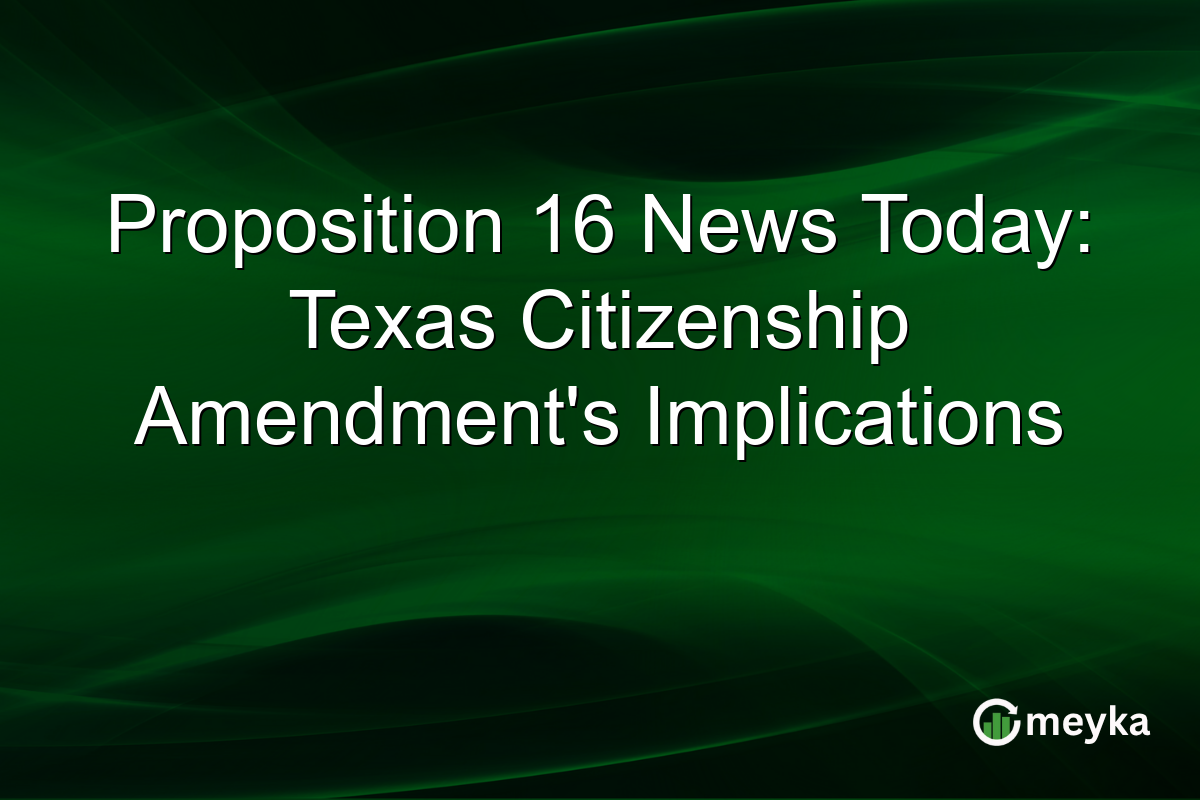Proposition 16 News Today: Texas Citizenship Amendment’s Implications
Proposition 16 in Texas is under the spotlight as it proposes a significant amendment to state voting laws. This measure mandates that only U.S. citizens can vote in Texas elections. With the proposal up for a vote, it has sparked a national debate about voter ID laws and citizenship requirements. As Texas prepares for a potential shift in its electoral framework, the implications could be far-reaching, influencing both state and national conversations on voting rights.
Understanding Proposition 16
Proposition 16 aims to amend the Texas Constitution to explicitly state that only U.S. citizens are eligible to vote in state elections. This move solidifies the existing stipulation under Texas voting laws but seeks to enshrine it in the state’s constitution. This topic has gained traction amid ongoing debates about election security and voter fraud in the United States.
For more details, you can explore recent discussions at Texas Tribune.
This move reflects a growing trend across various states to tighten voting regulations, often sparking heated debates among policymakers and citizens alike.
Impact on Texas Voting Laws
The implementation of Proposition 16 could reshape Texas voting laws. It reinforces the necessity of proving citizenship, aligning with a broader push for stricter voter ID laws. Proponents argue that it’s a crucial step in preserving election integrity. Critics, however, see it as a potential barrier that could disenfranchise eligible voters, particularly minorities who may face challenges in accessing documentation.
This trend parallels national efforts seen in states like Georgia and Florida. It’s part of a broader strategy to address perceived vulnerabilities in the electoral process and enhance voter trust.
National Context: Citizenship Requirements
Proposition 16 is not just a state issue; it reflects a national discourse on citizenship requirements in voting. Recently, similar measures have been proposed elsewhere, highlighting a shared concern across state lines about ensuring only eligible citizens participate in elections.
US citizenship requirements have become a focal point in modern election law debates. These requirements are seen as essential by some to maintaining democratic processes, while others see them as a guise for voter suppression.
Potential Ramifications of the Amendment
If passed, Proposition 16 could deter non-citizens from attempting to vote, thus safeguarding electoral processes. However, it may also lead to increased scrutiny of voter eligibility, necessitating robust systems to verify citizenship. Jurisdictions might face financial and logistical hurdles implementing such measures.
Thus, the amendment not only influences the legal landscape but also impacts electoral administration, voter perception, and public trust in elections.
Final Thoughts
Proposition 16 represents a pivotal moment in Texas and potentially across the U.S. Its outcome will likely influence future legislative efforts regarding voting laws and citizenship requirements. Supporters view it as essential for election integrity; critics fear it might hinder participation. What’s evident is the amendment’s role in shaping dialogues about voting rights and security. As debates continue, stakeholders from across the political spectrum must weigh these considerations carefully to balance security and accessibility in the democratic process.
FAQs
Proposition 16 is a proposed amendment to the Texas Constitution mandating that only U.S. citizens can vote in state elections. It aims to reinforce existing laws by enshrining citizenship requirements into the constitution.
If passed, Proposition 16 will solidify citizenship requirements for voters, potentially influencing voter ID laws. It aims to prevent non-citizens from voting, though critics argue it may disenfranchise certain voter groups.
The proposition reflects a broader national trend of tightening voting requirements. It contributes to the ongoing debate over election security and voter fraud, highlighting differing perspectives on citizenship requirements in the voting process.
Disclaimer:
This is for information only, not financial advice. Always do your research.






